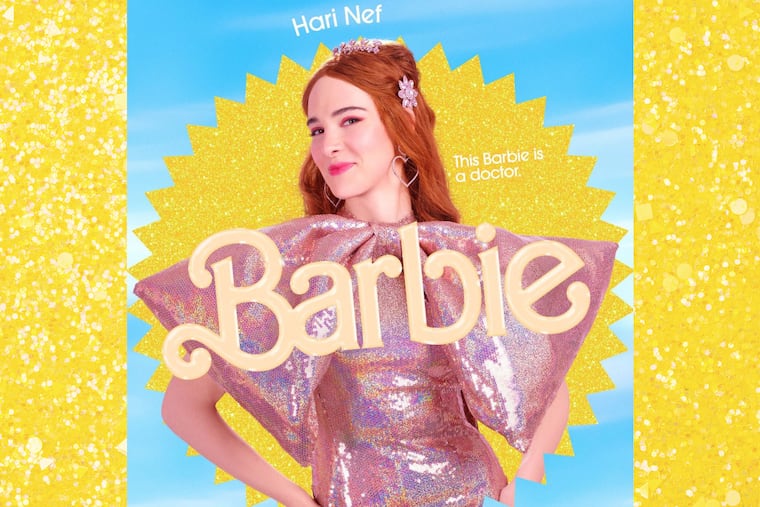Philly’s Hari Nef stars as one of several Barbies in the new film. Far-right conservatives are mad about it.
Hari Nef — the trans actress from Philadelphia — plays one of the Barbies in Greta Gerwig's new film about the doll starring Margot Robbie. But conservatives are angry about Nef's role.

On the heels of its premiere, Greta Gerwig’s highly anticipated Barbie film is already drawing criticism from some conservative crowds. And at the center of those critics’ disapproval is Philly-born actress Hari Nef.
In Barbie, a string of Barbies and Kens live in Barbieland and share the same names. Each Barbie and Ken takes on a different personality and role. The main Barbie is played by Margot Robbie and the main Ken by Ryan Gosling. But other notable actors playing the respective dolls include Issa Rae, Kate McKinnon, Dua Lipa, Simu Liu, and John Cena.
Nef, who is known for her roles in And Just Like That... and Transparent and was the first trans woman signed by IMG Models, plays one of the Barbies. Nef’s inclusion and some of the feminist themes in Gerwig’s Barbie have been praised as a diverse and empowering portrayal of the iconic doll. But far-right personalities and commentators see it differently.
» READ MORE: Philly-born transgender model is breaking down fashion barriers
Last week, a review by the Christian site Movieguide slammed the film for including queer talent.
“The new Barbie movie forgets its core audience of families and children while catering to nostalgic adults and pushing lesbian, gay, bisexual, and transgender character stories,” read the article — which is titled “WARNING: Don’t Take Your Daughter to Barbie.” Fox News has since quoted the review.
Ginger Gaetz, the wife of U.S. Rep. Matt Gaetz (R., Fla.) criticized the film after attending its premiere this week, saying that it “unfortunately neglects to address any notion of faith or family.” She went on to call Ken’s portrayal “disappointingly low T” — suggesting low testosterone levels — and a “beta” male, not an alpha.
As noted by the LGBTQ+ digital magazine, them, a video of a pastor condemning Barbie for being full of “transsexual and transgender homosexuality” went viral online.
Right-wing commentators Charlie Kirk and Ben Shapiro both slammed Nef’s casting ahead of the film’s release.
Still, those involved with the making of Barbie say fearmongering over a “trans Barbie” is just that.
In an interview with Attitude, Robbie confirmed the dolls don’t have sexualities — because, well, they’re dolls.
“They don’t actually have sexual orientations because they don’t have reproductive organs,” she said. Still, when casting, Robbie — who is also one of the movie’s producers — and Gerwig wanted to make sure Barbieland was inclusive. “It was so important that every person that was coming aboard the party would be able to represent someone else that could be watching this movie.”
Along with Nef, other LGBTQ+ cast members include Kate McKinnon, Alexandra Shipp, and Scott Evans.
In an interview with Out, Nef said she wasn’t cast because she was trans — adding that the film’s executive producer said he didn’t know Nef was trans in the first place.
» READ MORE: Why is ‘Barbenheimer’ having such a cultural moment?
“It’s probably positive for Mattel to include me in this because we’re trying to show all different kinds of Barbies, but that’s not why I got the role,” she said. “I got the role because I fit the role. To be honest, I don’t look much different in the movie than the Barbies that I had when I was a kid.”
Still, Out reported that the movie has a strong message for trans women about “the beauty of being a person rather than an ideal.”
“I think as a trans girl, it’s easy to get caught up in big dreams of what you’ll become. And it’s inevitable that you’ll get struck down by external messages and obstacles of what you’ll never be and what you won’t be able to do. You’re caught constantly between striving for perfection and recoiling from rejection. It’s hard,” Nef said.
“As much as there’s a celebration of femininity and being a girl in this [movie], I think there’s also an encouragement of letting go of the checklist we ascribe to living and living your life and being in your body your way, on your own terms,” she said. “The best that we can do as women, as trans women, is be there for each other and take ourselves at face value, without relying on the green light from someone or anyone else.”
Despite the anti-Barbie wave and a hashtag to #BoycottBarbie (which has gained little traction), Barbie is expected to bring in an estimated $95 to $105 million opening weekend, Variety reports.